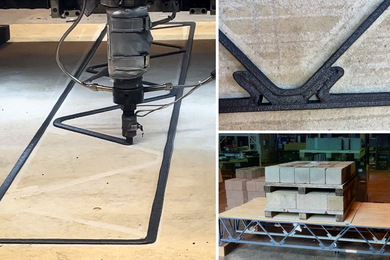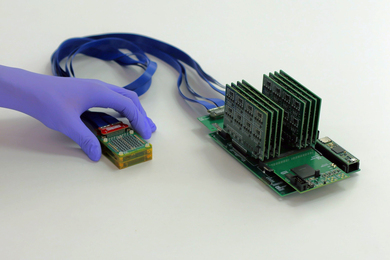Next Monday, May 22, the Institute will get its first look at the new official MIT electronic calendar, which will provide community members with an easy-to-use, searchable database calendar listing just about any sort of event an MIT group wants to publicize: scientific lectures, poetry readings, meetings, sporting events and so on.
The MIT Events Calendar at http://events.mit.edu was put together by an Information Systems (I/S) team, and I/S will manage the calendar and provide user help through an extensive online help menu and through the Computing Help Desk.
The new calendar -- based on the student-run TechCalendar, which will cease operations on May 19 -- offers new search features, more categories of events and better help service. Events Calendar is better-looking, easier to use and more powerful than the old calendar, but similar enough that previous users will feel comfortable.
CALENDAR'S DEVELOPMENT
The original TechCalendar was created by two MIT undergraduates: Doug Heimburger, a senior in management and former editor-in-chief of The Tech, and Boris Zbarsky, a junior in physics (see stories in MIT Tech Talk on December 16, 1998 and in Technology Review in the MIT News section in January/February 2000). TechCalendar went on line in August 1998 and met with immediate success.
Working through the Intellectual Property Office, the students and the Institute negotiated a mutually satisfactory agreement and I/S took over programming for the calendar. The MIT Events Calendar, with a new web interface design and added functionality, was developed by I/S under the sponsorship of Vice President Kathryn Willmore. Web Communication Services (formerly CWIS), the group responsible for publishing the official MIT web site and integrating information across MIT web sites, actively participated in the calendar's development and advocated for its success.
Development of the new calendar began in April 1999. In May, individuals and groups that needed to advertise events on campus were identified and their input sought through a questionnaire and personal interviews. Throughout the programming phase, the I/S team consulted with numerous people -- particularly individuals who head communications for various departments and groups on campus -- on questions of policy, design and structure. The Publishing Services Bureau consulted on the design of the graphical interface.
During the beta testing phase, many community members volunteered to try using the calendar and make comments. Others agreed to be observed while using the calendar to help the I/S team see which aspects were easily understood and which needed additional tweaking.
While work has gone on behind the scenes for many months, the public transition to the new calendar will be quick and painless. As of today (May 17), TechCalendar will no longer register new groups. Beginning Friday, May 19, it will not accept new event entries, and on Monday morning, May 22, Events Calendar will take over.
Throughout the summer, the I/S team will continue to finetune the new system based on feedback from the community. An updated version likely will go on line in late August.
IMPROVED FUNCTIONALITY
A link from the MIT home page at
Registered users of TechCalendar have automatically been registered to post events on the new calendar. Those who use Events Calendar to list their events will find a more stable and intuitive data entry process. The web site has been designed so that entering groups or events or searching the listings is easy.
One of the calendar's new features makes it possible to download particular events in several different formats. For instance, a community member could enter a semester's worth of seminars for a research group, then search for those events and download them in HTML to a web site, or in simple text to a word processing document.
The online calendar will also serve as an archive of Institute events. Users will be able to search for past events for up to one year, and older events will be stored in an electronic archive.
Help will be readily available for those who need it. The calendar has extensive information and step-by-step instructions that can be accessed from the home page. The Computing Help Desk will offer support beginning May 22 by calling x3-1101 (Macintosh users) or x3-1102 (PC users), or by sending e-mail to casetrackers@mit.edu. Those with questions about the transition itself can send e-mail to events-team@mit.edu.
In addition, I/S will also hold 12 Quickstart demonstrations over the next few weeks to introduce the community to the new system. Sessions will be held in the Demo Center in Building N42 (211 Massachusetts Ave.). The dates are:
��������� May 22 -- 10am
��������� May 25 -- 2pm
��������� May 30 -- 10am
��������� May 31 -- 9am, 10am and 2pm
��������� June 5 -- 10am and 2pm
��������� June 7 -- 2pm
��������� June 8 -- 2pm
��������� June 13 -- 10am and 11am
TECH TALK
MIT Tech Talk, which helped the TechCalendar designers prepare the Seminars and Lectures section of the original online calendar and train community members to use the calendar through several IAP courses, has downloaded seminars and lectures from TechCalendar since January 1999. Tech Talk will now use the Events Calendar to obtain those listings for its printed calendar. In the future, Tech Talk may begin to take other events, such as meetings and social events, from Events Calendar as well.
To have listings printed in Tech Talk, users must have their events listed on line before the regular Tech Talk deadline of noon on the Friday before publication. New users to Events Calendar are urged to register their groups and enter their events several days in advance of that deadline to avoid being excluded from the printed calendar.
A version of this article appeared in MIT Tech Talk on May 17, 2000.





